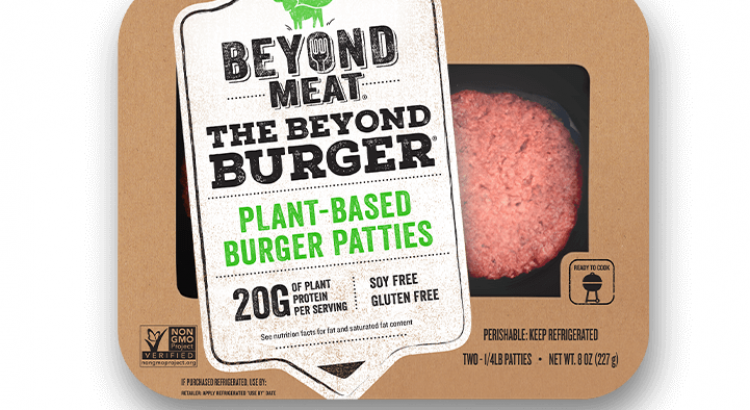Beyond Meat Inc. (BYND:NASDAQ) had a very strong IPO today. Priced at $25 a share, the stock opened trading at $46 and closed at nearly $66, a gargantuan $3.9 billion valuation (based on 59,751,794 diluted shares.)
Although I personally wouldn’t buy BYND at this price or at this time, I can see why the stock is skyrocketing in its debut. In this article I’ll be giving a brief description of the company, discussing some of its macro growth drivers, and why I’ve decided to pass on buying shares for now.
What does Beyond Meat, Inc. do?
Beyond Meat produces plant-based meat products that aim to simulate the experience of actual beef, pork, and poultry. Their flagship product is The Beyond Burger which is designed to look, cook, and taste like ground beef while being 100% plant-based. The company aims to disrupt the $1.4 trillion meat industry and markets directly to meat eaters rather than vegans and vegetarians (for instance, their products are found in the meat section at the grocery store next to actual meat).
Beyond Meat’s products are available in 30,000 distribution points, primarily in the US. Besides the meat case of supermarkets, Beyond Meat’s products are in over 15,000 restaurants, hotels, universities, and food service outlets including Carl’s Jr., Del Taco, TGI Friday’s, and A&W. Famous investors of Beyond Meat include Bill Gates, Leonardo DiCaprio, and former McDonald’s CEO, Don Thompson.
The company is headed by CEO Ethan Brown who founded the company in 2009. According to Brown’s prospectus letter, his family owned a Holstein dairy farm in Maryland and he was a partner with his father. Ethan’s close proximity to livestock inspired him to come up with a way to redefine the idea of meat – not as the source (e.g. chickens, pigs, and cows) but the chemical composition – amino acids, lipids, trace minerals, etc. – all of which can also be found in plants.
Growth Strategy & Growth Drivers
Beyond Meat’s growth plan is straight-forward: expand manufacturing capabilities and get more product into more distribution points. According to the company’s prospectus, Beyond Meat will be investing $40 to $50 million in additional manufacturing facilities and expanding their R&D and sales & marketing with an additional $50 to $60 million. Today’s IPO, which raised $241 million for the company, provides the necessary cash infusion to make these investments and accelerate progress. While Beyond Meat had approximately $30.4 million in debt at the end of 2018, the debt should be manageable due to the $241 million raised in the IPO, its current market valuation, long growth runway, triple-digit top-line growth last year, and the significant publicity the company is receiving which should drive interest in the company’s products.
I think Beyond Meat has considerable potential as a company. They have a compelling product with a great story and a lot of media buzz behind it. I think their marketing strategy is shrewd, and they’re in a product category that should organically see increased demand over time.
In 2015, the World Health Organization classified processed meat as a carcinogen (cancer-causing), and red meat as a probable carcinogen. While many consumers haven’t changed their eating habits significantly based on these classifications, they will probably change over time, and companies like Beyond Meat are bringing compelling, alternative products to the mainstream market.
As climate change continues to become an ever-increasing concern, the sustainability of producing and consuming beef at elevated levels has been repeatedly challenged. According to the USDA’s Agricultural Research Service and National Cattlemen’s Beef Association in 2018, it takes 308 gallons of water to produce 1 pound of beef. Furthermore, methane gas from cattle has a more potent effect on climate change than CO2.
Moreover, an increasing number of athletes, celebrities, and other influential people have decreased their meat consumption or gone completely vegan over the past decade. For instance, 2016 NBA Champion, Kyrie Irving, switched to a plant-based diet in 2017 and noticed improved performance, as did his coach, particularly in back-to-back games. After going public about his vegan diet, Beyond Meat was able to convince Irving into becoming a product ambassador for the company. Irving is just one athlete/celebrity among many who has chosen to eschew meat. These celebrity endorsements have the power to shift public awareness and influence demand over time, particularly with Gen Z, but also Millennials and older generations. As the vegan stereotype changes, it should drive growth for companies like Beyond Meat.
Why I’m Not Buying BYND IPO
After today’s trading, Beyond Meat is now sporting a $3.9 billion valuation. But in 2018, Beyond Meat had a net loss of $29.8 million on $87.9 million revenue. Although the company is growing fast and has plenty of potential, these numbers are long way from warranting a $3.9 billion valuation. Even if Beyond Meat can theoretically justify that valuation (or more) on a terminal basis, it’s way too much to pay for the company at this time. I refuse to go chasing and would rather wait for a much more compelling entry.
With the Federal Reserve Chairman, Jerome Powell, refusing to confirm a rate cut for the year yesterday, it’s dangerous to rely on the current low interest rate environment to keep overpriced stocks propped up for much longer. In other words, I think there’s a decent chance that within the next few years, I can buy BYND at a better price regardless if the underlying company outperforms expectations. And by then, I’ll have gotten more visibility on the company’s execution, its competitors, and the industry landscape.
Disclosure: I have no position in any of the stocks mentioned in this article and have no plans to initiate a position within the next 72 hours. This article expresses my opinions only, and is not to be misconstrued as investment advice or a recommendation to buy or sell stock. For more information, refer to the Terms of Use.

